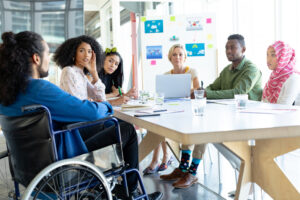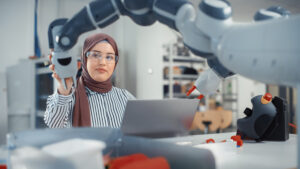International Women’s Day calls on us to #BreakTheBias and highlights the huge impact that unconscious bias can play in the decisions we make, the people we hire and the way in which we understand the world. In challenging ourselves to look at own biases — and highlight others’ — we help to dissolve assumptions and dismantle inequality. Capgemini’s Billie Major, Head of HMRC Market Unit, Gareth Wilson, Financial Services Head of UK Banking and Capital Markets, Priyal Bhanderi, Software Engineer Lead and Natalie Griffiths, Senior Consultant, Invent discuss eight powerful questions we can ask of ourselves, others and our organisations, to #BreakTheBias and liberate everyone’s potential.
1. Do I need to call out bias?
Calling out bias where you see it is crucial to challenging it and changing cultures. ‘I’ve always been direct, but not everybody is comfortable doing that,’ says Billie. ‘But there are other ways to do it: you can take someone to one side and ask, ‘did you realise you were doing that?’ or bring it up in general conversation when the person in question is there to inform them in a more indirect way.’ Enlisting support if needed is also crucial. At Capgemini, Inclusion and Respect Ambassadors help talk to people demonstrating bias if others feel they cannot for any reason. For Billie though, a key part of challenging bias is making it visible to those doing it because it can often be unconscious. ‘Most people actually don’t realise they’re being biased,’ she notes. ‘And they’re usually pretty mortified when they find out that’s how they’re being perceived.
2. Am I relating to a person, or an assumption?
Going one step further in your questioning and relating is the way to get beyond immediate assumptions and understand people’s needs and outlooks from their unique perspective. ‘I have always tried to always try to get to know people, to really understand what’s most important for them as a person and as an individual, because sometimes in a corporate sense we can view people collectively or identify groupings or organisational constructs,’ says Gareth. ‘Viewing everybody we work with and for as a human and investing in a relationship on a personal basis is so important. That helps us to ask questions rather than make assumptions – and one of the great things about the Capgemini culture is that emphasis on a very strong human dimension and personal connection.
3. Are biased perceptions harming my potential?
Can you be a victim of being too good at something? ‘There’s a risk in a corporate environment where there can be a perceived wisdom around the ‘things you’re good at’ and ‘the things you’re not good at’, notes Gareth. ‘I might be ‘known’ as good at delivery, but not at sales, or good with clients but bad with technology. And those perceptions can become self-fulfilling, because they get reinforced and that becomes a real unconscious bias. In the end, those can be limitations to your career because you don’t get the opportunity to demonstrate the thing that people feel you’re not necessarily strong enough in — or just continue to do the thing that is your perceived strength’
4. Are they really ‘only young’?
Age bias is an issue that many older people can experience, but for younger people the assumption that they automatically lack skills or insight due to youth can be equally pernicious. Priyal, in her fourth year of a degree apprenticeship, sits at intersections of gender, ethnicity and age, but notes it is the age bias that she has noticed more. ‘When I started, there was a perception that maybe I didn’t know what I was doing, which makes sense because I didn’t! I had just come straight out of sixth form. But now that I’m four years into the apprenticeship, I know my way around the company and I know how to do my role.
5. Is it bias, or is it lack of understanding?
Test your assumptions, for what you perceive as bias may just be a lack of perspective or thought among colleagues. Discussing the issue of parental bias, Natalie notes: ‘I’ve taken practical steps to put time in the diary for things such as school runs, and I protect that time. Mostly, people respect that, but when there’s been a pushback, I go to the source to have a conversation. Often that individual hasn’t even asked why I need to change a time or couldn’t make a meeting.’ Sometimes Natalie feels that she has to challenge her own bias…against bias. ‘I felt like I was being bold to say ‘I can’t do that time because I’ve got a family commitment, but that might have been my own bias as well, because the other person probably wasn’t even aware. The first time I said, ‘could we change that time?’ my anxiety levels dropped, and I’ve been forthright about that since.
6. Am I still learning?
Challenging biases is ongoing work, and even within communities where it is a point of awareness it is important to keep learning and never feel you’ve ‘achieved’ impartiality. For Natalie, self-awareness is key to growth. ‘As an out lesbian for many years, I’ve had to check my own bias within the ever-growing LGBT+ community. I need to make sure that I continue to learn. I can sometimes say things without thinking which in some cases is great but to be able to respect and understand other people’s positions, whether that’s about their gender, their identity is so important. And for me, the OUTfront community (LGBT+ & Allies network) that we’ve built within Capgemini is such a passionate supportive community of individuals and so important.
7. Should I do a bias test?
If you’re not sure what your biases are then doing an online test such as the Harvard Implicit Association Test can help to highlight areas to work on. ‘Doing a bias test is eye-opening,‘ says Natalie. ‘In the wake of Black Lives Matter I had a conversation with a good friend who is Spanish-Asian who explained to me that he felt uncomfortable sometimes walking into a room that had a majority of white people. It never occurred to me that he might feel uncomfortable in any kind of situation and really made me think. I went away and did the test and to my horror discovered some unconscious biases that that I didn’t think I had. My tip is to keep challenging yourself. We may think that we don’t have any unconscious biases, but obviously we do; we’re human beings and an imperfect species.
8. Do I need ‘second pair of eyes’ on my decision?
‘Some of the results of the bias tests I did surprise me, and some didn’t,’ says Billie. ‘I was aware actually that I had certain biases and one of the things that I’ll do now, particularly if I am interviewing people, is to be very conscious and careful if an individual matches one of the biases that I know I’ve got. I ask colleagues much more for their viewpoint – ‘this is what I think, what do you think?’ — and cross check my opinions to make sure that bias isn’t sneaking in.’ Making sure you know where your biases are and trying to make sure that they don’t influence the decisions you make and do is crucial and part of that can include getting that second pair of eyes on a situation where you think you might be in danger of making a decision based on your own unconscious biases.



